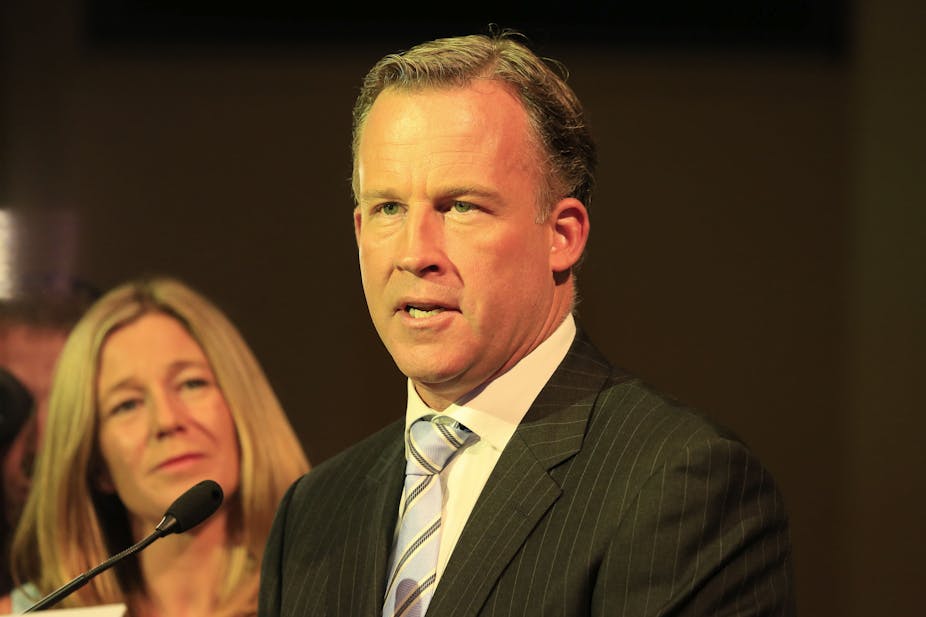On Saturday, the winds of change took on the proportions of a Bass Strait gale to deliver the Liberal Party an emphatic victory in the Tasmanian state election. The Liberals, under long-serving leader Will Hodgman, secured over 51% of the primary vote and an elusive parliamentary majority.
The Liberal victory was widely anticipated. After 16 years in power, Labor’s term in government had run its course. Despite a stoic effort as leader, premier Lara Giddings was always going to fall victim to the difficult economic conditions facing the island state.
When combined with deep internal divisions within her own party and the fact that the Tasmanian Liberals managed to sustain a disciplined and extremely effective “Abbottesque” campaign against the Labor-Green minority government, the result was almost inevitable.
Saturday’s result may never have been in doubt but the nature and magnitude of the Liberal victory poses challenges for all sides of politics including, perhaps ironically, premier-elect Will Hodgman.
Results
Contrary to some expectations (not least their own), the Green vote was down over 8% (to 13.5%). The Greens are likely to lose two, possibly three, of their five seats in parliament. Whereas polls had suggested that the Greens, with their clearly defined and committed constituency, would maintain their vote – in contrast to Labor – this was not the case.
Where these Green votes went on Saturday is something of a mystery, and will be of interest to Green and ALP strategists alike. The result may see the Greens temper their enthusiasm for seizing the reins of government, but there is little doubt that they will remain an important part of the Tasmanian political landscape and will ensure that the new government can’t take parliament for granted.
As anticipated, Saturday was a dark day for Labor in Tasmania. Beyond the poor poll result, the task of rebuilding will be all the more difficult given the party lacks a clear constituency and is hopelessly wedged on many issues such as forestry. To add insult to injury, it appears likely that the ALP also lost its next generation of leaders in the rout.
The key problem facing Labor nationally, and even more acutely in Tasmania, is that its political base is under threat from both left and right. The progressive vote is increasingly turning to the Greens. Meanwhile, disillusioned, socially conservative blue-collar voters are turning to the Liberal Party and perhaps, in protest, to the Palmer United Party.
The Tasmanian Liberals’ task of capturing the “Howard battlers” was made easier by the Labor-Green partnership. Clearly the Tasmanian Labor Party’s faux 11th-hour separation from the Greens was not going to overcome this fundamental challenge, especially when Giddings had been a champion of progressive issues such as same-sex marriage.
The task of renewal and rebuilding the ALP was also dealt a blow. David O’Byrne and Brian Wightman, two of the rising stars of the Tasmanian ALP, lost their seats. O’Byrne may yet receive a political lifeline in the form of a casual vacancy should Giddings resign from parliament, but this would be an inauspicious start for a new Labor leader.
Rebecca White, the young, first-term Labor member from the rural seat of Lyons, was perhaps the standout candidate of the campaign. But given the challenge of leading the ALP over the next four years, it would be in both her and Labor’s interests to look elsewhere.

The forestry challenge
Perhaps the greatest challenge awaits Hodgman and his new ministerial team. He has clearly proved that he is resilient, disciplined and effective in opposition. What is less clear is whether he possesses the more subtle and elusive skills required to be an effective premier.
Prosecuting an unrelenting critique of government from the opposition benches is one thing, but articulating a viable vision for Tasmania and implementing policies to achieve this goal is a much more demanding task.
The key is here is managing community expectations and being honest with voters about any state government’s limited capacity to achieve significant economic and social change amid overwhelming national and international forces. Voters in Tasmania want a government that underpromises and overdelivers.
Time will tell whether Hodgman can master the subtle art of political leadership. But we won’t have to wait long to find out whether he is up to the task, given that challenges will come thick and fast in the coming months.
Forestry will be the first test for the incoming government. The issue here is that the Liberals have committed to tearing up the forestry peace deal brokered between conservation groups and industry representatives.
This strategy appeals to those who blame the significant decline in the forestry sector over the past decade (it now accounts for about 2% of Tasmania’s economic output) on a lack of timber supply as a result of “locking up the forests”.
However, the reality is that forestry’s demise is largely due to falling demand in world markets, especially for timber that lacks Forest Stewardship Council endorsement. That major industry players and the international consumers of Tasmanian forestry products have joined conservation groups in urging the Liberals to reconsider their forestry policy adds weight to this argument.
The bigger picture here is that forestry is yet another example of government making promises it can’t deliver. A state government can’t hold out against international market forces.
The subtle art of political leadership is to explain the challenges facing the polity and the limits of government power while crafting strategies designed to ensure the communities that governments serve have the resources and strategies to adapt to the ever-changing circumstances they confront.
Despite its diminishing economic significance, forestry in Tasmania may yet claim another political scalp.

